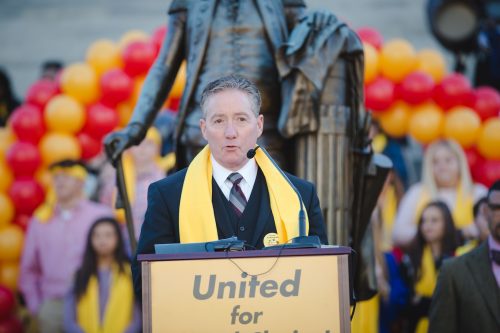This article was first published on palmettopromise.org
When it comes to fixing the problems in our state’s worst performing school districts, nearly everyone thinks that bold action at the state level is needed.
But, in the face of immense local pressure to stand down, will the state act?
There were signs of life this week when a SC Senate Committee took up a section of the 84-page “omnibus” education bill dealing with the tension between state responsibility and local authority.
In the wake of recent test scores showing that South Carolina K-12 education outcomes are some of the worst in the nation, falling behind Mississippi in 4th grade reading scores, the Senators seemed to be ready to take specific action to address problem districts: taking over schools districts, focusing on management instead of more money at the local level, and consolidating small and shrinking districts.
- Seizing the reins. On takeovers, Superintendent of Education Molly Spearman highlighted the state’s previous successes when it has assumed management of school districts Spearman noted in her testimony that those gains need to be maintained so that the districts do not go back to their ‘old ways’ and also stressed the importance of strong local leadership:We don’t want to do all this work and walk away and hope it holds. I need your help, so they’re not immediately going back to the old ways… If you don’t have good leadership, the system will not work.The Department is currently running portions of district operations in districts in Florence, Williamsburg, and Allendale counties. Each operation has been designed differently to meet the varying needs in each district.
- Management, not money. Later in her testimony, Superintendent Spearman added that money is not always the answer in these districts. Often times, as Palmetto Promise has identified, the money is there, but it ends up going anywhere but the classroom. Spearman said:We’ve allowed school districts to not do well and kept sending more money, but do not have a lot to show for it. We can’t just keep on sending money and expecting it to improve. In the situations I’ve seen, the money was there. It was not being managed correctly.
- Consolidating tiny districts. In addition to state takeover of school districts, another proposed solution discussed by Superintendent Spearman was school district consolidation. She announced that 8 of the 13 school districts who serve fewer than 1,500 students were meeting the next day to discuss consolidation plans following state budget provisions that provide funding for small districts to consolidate. (Senator Tom Young’s consolidation bill, S.203, is waiting in the wings next legislative year as well.)

Palmetto Promise has long advocated for consolidating “small and shrinking” school districts to reduce administrative spending and drive dollars to the classroom. Our September 2018 report highlighted those districts and the money that could be saved through consolidating – $338 million over 5 years.The adjacent graphic shows the districts in question and how they’ve shrunk over the last 20 years—some nearly 60%! - Finding HOPE. Consolidation is one of many policy directions that Palmetto Promise recommends in our H.O.P.E (Help Our Pupils Excel) plan. But there is more, like directing money we are already spending to where it is most needed: the classroom. As states like Florida and Mississippi perform better while spending less money, it’s time South Carolina recognizes the need to spend smart, not more.On Monday, Senator John Matthews expressed his dismay with our current trajectory, noting that we are falling behind our southeastern peers in K-12 education outcomes, “We’re going back to where we’ve been… And is that really where we want to be?”
The bottom line to this week’s hearing was stated best by Senate Education Chairman Greg Hembree who said:
[The state has] this burden that we have to carry out, and if we have adopted a model that is failing to work, that model being a locally elected school board, that responsibility falls back on us.
And we can’t just shirk it off and say, ‘We’re going to send you a little more money and hope it goes away,’ or ‘We’re going to build you a new gymnasium, and that’ll make everything better,’ and then y’all can have your control and continue what you’ve been doing and watch the kids chronically fail and in many of these districts, they have been failing generation upon generation.
We’re going to have to be bold and look at systems that are failing and do something about those systems.
We couldn’t agree more. We need to be “bold” in order to get South Carolina’s K-12 education on track. Consolidation, taking over districts in certain circumstances, tying funding to performance, better management of current funding, and getting more dollars to the classroom is a start.
A fairer, more robust financing system and real, educational choice are sorely needed as well.
To get us out of 50th place, we need all of the above.
Photo: State Sen. Greg Hembree from a school choice rally in 2018.

